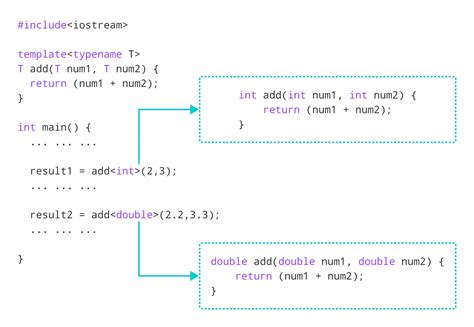C++ templates are a powerful feature that allows for generic programming, enabling developers to write reusable code that can work with various data types. One of the key aspects of templates is the ability to define member functions for template classes. In this article, we will delve into the world of C++ template member functions, exploring their syntax, usage, and best practices.
What are Template Member Functions?
Template member functions are member functions of a template class that can be used to perform operations on the template class's data members. These functions are defined inside the template class and can be used to manipulate the data members of the class. Template member functions are essential for creating reusable and generic code that can work with various data types.
Declaring Template Member Functions
To declare a template member function, you need to use the template keyword followed by the function's return type, name, and parameters. The function's body is defined inside the template class. Here's an example:
template
class MyClass {
public:
T data;
// Template member function declaration
void printData() {
std::cout << data << std::endl;
}
};
In this example, printData() is a template member function that takes no arguments and returns no value (i.e., it's a void function). The function's body is defined inside the template class and uses the std::cout statement to print the value of the data member variable.
Defining Template Member Functions Outside the Class
While it's possible to define template member functions inside the class, it's often more convenient to define them outside the class. This is especially true for larger functions or when you want to keep the class declaration separate from the function definitions. To define a template member function outside the class, you need to use the template keyword followed by the function's return type, name, and parameters, just like when declaring the function. However, you also need to specify the class name and the template parameter(s) using the :: operator. Here's an example:
template
class MyClass {
public:
T data;
// Template member function declaration
void printData();
};
// Template member function definition outside the class
template
void MyClass::printData() {
std::cout << data << std::endl;
}
In this example, the printData() function is defined outside the MyClass class using the :: operator to specify the class name and the template parameter T.
Using Template Member Functions
To use a template member function, you need to create an instance of the template class and call the function on that instance. Here's an example:
int main() {
MyClass myIntClass;
myIntClass.data = 10;
// Call the printData() function
myIntClass.printData(); // Output: 10
MyClass myStringClass;
myStringClass.data = "Hello";
// Call the printData() function
myStringClass.printData(); // Output: Hello
return 0;
}
In this example, we create two instances of the MyClass template class, one with an int template parameter and another with a std::string template parameter. We then call the printData() function on each instance, which prints the value of the data member variable to the console.
Template Member Function Overloading
Just like regular functions, template member functions can be overloaded to provide different implementations for different template parameters. However, when overloading template member functions, you need to be careful not to create ambiguous function calls. Here's an example:
template
class MyClass {
public:
T data;
// Template member function declaration
void printData();
// Template member function overloading for int template parameter
void printData() {
std::cout << "Integer: " << data << std::endl;
}
// Template member function overloading for std::string template parameter
void printData() {
std::cout << "String: " << data << std::endl;
}
};
// Template member function definition outside the class
template
void MyClass::printData() {
std::cout << data << std::endl;
}
In this example, we overload the printData() function to provide different implementations for int and std::string template parameters. When calling the printData() function, the compiler will select the correct implementation based on the template parameter.
Template Member Function Specialization
Template member function specialization allows you to provide a specialized implementation for a specific template parameter. This is useful when you need to provide a custom implementation for a particular type. Here's an example:
template
class MyClass {
public:
T data;
// Template member function declaration
void printData();
};
// Template member function definition outside the class
template
void MyClass::printData() {
std::cout << data << std::endl;
}
// Template member function specialization for int template parameter
template <>
void MyClass::printData() {
std::cout << "Integer: " << data << std::endl;
}
In this example, we specialize the printData() function for the int template parameter. When calling the printData() function on an instance of MyClass with an int template parameter, the specialized implementation will be used.
Gallery of Template Member Function Examples
Here are some more examples of template member functions:






FAQ Section
What is a template member function?
+A template member function is a member function of a template class that can be used to perform operations on the template class's data members.
How do I declare a template member function?
+To declare a template member function, use the `template` keyword followed by the function's return type, name, and parameters.
Can I define a template member function outside the class?
+Yes, you can define a template member function outside the class using the `::` operator to specify the class name and the template parameter(s).
We hope this article has provided you with a comprehensive understanding of C++ template member functions. With this knowledge, you can create reusable and generic code that can work with various data types.
